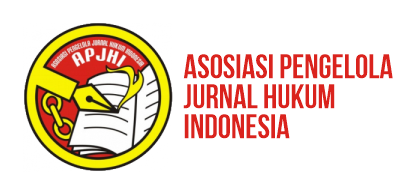Implications of Standard Clause Changes in Grab Challenge Program on Consumer Rights
Abstract
This study aims to analyze the implications of changes to the standard clauses of the Grab challenge program on consumers. The research method used is normative with a statutory approach.The results of the study show that the implications of the standard clause on the Grab challenge program for consumer protection are that the clause contains several things that are detrimental to consumers, such as limiting Grab's liability, providing disproportionate compensation, and the existence of clauses that burden consumers. This is contrary to the principles of consumer protection. Changes to the standard clauses on the Grab challenge program affect consumer rights and obligations, where consumers have more limited rights, such as the right to choose, the right to information, and the right to security. On the other hand, consumer obligations become more burdensome, such as the obligation to accept unilateral changes and the obligation to resolve disputes through alternative dispute resolution.
Keywords
Full Text:
PDFReferences
Andika, Edi. "Keabsahan Perjanjian Baku Dalam Perjanjian Kredit Bank Dihubungkan Dengan Asas Kebebasan Berkontrak." Lex Privatum 3, no. 2 (2015). https://ejournal.unsrat.ac.id/index.php/lexprivatum/article/view/7828.
Atmoko, Dwi. "Penerapan Asas Kebebasan Berkontrak Dalam Suatu Perjanjian Baku." Binamulia Hukum 11, no. 1 (2022): 81-92.
Budiman, David. "Implementasi Undang-Undang Perlindungan Konsumen Terhadap Perjanjian Baku Bermuatan Klausula Eksonerasi." Jurnal Pendidikan Tambusai 8, no. 1 (2024): 1218-26.
Ginting, Miko Susanto. "Menegaskan Kembali Keberadaan Klausula Baku Dalam Perjanjian." Jurnal Hukum Dan Peradilan 3, no. 3 (2014): 223-36.
Hanim, Lathifah. "Perlindungan Hukum Bagi Para Pihak Dalam E-Commerce Sebagai Akibat Dari Globalisasi Ekonomi." Jurnal Pembaharuan Hukum 1, no. 2 (2014): 191-99.
Hermawanto, Ariesani, and Melaty Anggraini. "Globalisasi, Revolusi Digital Dan Lokalitas: Dinamika Internasional Dan Domestik Di Era Borderless World." LPPM Press UPN" Veteran" Yogyakarta, 2020. http://eprints.upnyk.ac.id/24076/1/BUKU%20GLOBALISASI%20DAN%20LOKALITAS%20UNTUK%20DICETAK%20_KE%20LPPM%20.pdf.
Hotana, Melisa Setiawan. "Industri E-Commerce Dalam Menciptakan Pasar Yang Kompetitif Berdasarkan Hukum Persaingan Usaha." Jhbbc, 2018, 28-38.
Ishaq, Ishaq. "Metode Penelitian Hukum Dan Penulisan Skripsi, Tesis, Serta Disertasi." Alfabeta, 2017.
Lestari, Ade Putri. "Kepastian Perlindungan Hukum Pada Klausula Baku Dalam Perjanjian Pinjaman Online Di Indonesia." SUPREMASI: Jurnal Hukum 2, no. 2 (2020): 174-93.
Mahendar, Fahdelika, and Christiana Tri Budhayati. "Konsep Take It or Leave It Dalam Perjanjian Baku Sesuai Dengan Asas Kebebasan Berkontrak." Jurnal Ilmu Hukum: ALETHEA 2, no. 2 (2019): 97-114.
Maulana, Muhammad Arif, Diah Sulistyani RS, Zaenal Arifin, and Soegianto Soegianto. "Klausula Baku Dalam Perjanjian Kredit Bank Perkreditan Rakyat." Jurnal USM Law Review 4, no. 1 (2021): 208-25.
Mustapa, Muhammad Iqbal, Zamroni Abdussamad, and Mellisa Towadi. Rasiolegis Kewenangan Mengadili Perkara Fiktif Positif Dalam Perundang-Undangan. 1st ed. UII Press. Accessed December 19, 2024. https://dpsd.uii.ac.id/uii-press/katalog/rasiolegis-kewenangan-mengadili-perkara-fiktif-positif-dalam-perundang-undangan/.
Panjaitan, Torang. "Konsep Kontrak Baku Dalam Kegiatan Lembaga Pembiayaan Berdasarkan Undang-Undang Nomor 8 Tahun 1999 Tentang Perlindungan Konsumen." Jurnal Gagasan Hukum 2, no. 02 (2020): 135-58.
Rantung, Alexsandre. "Penggunaan Kontrak Baku Dalam Perjanjian Dan Penerimaan Pihak Yang Terlibat Di Dalamnya." Lex Privatum 8, no. 2 (2020). https://ejournal.unsrat.ac.id/index.php/lexprivatum/article/view/29779.
Rumengan, Tesalonika Putri Zefanya. "Kajian Yuridis Terhadap Perjanjian Jual Beli Rumah Melalui Proses Kredit Berdasarkan Kitab Undang-Undang Hukum Perdata Buku Iii Tentang Perikatan." Lex Administratum 10, no. 2 (2022). https://ejournal.unsrat.ac.id/index.php/administratum/article/view/40530.
Sinaga, Niru Anita. "Peranan Asas-Asas Hukum Perjanjian Dalam Mewujudkan Tujuan Perjanjian." Binamulia Hukum 7, no. 2 (2018): 107-20.
Syamsiah, Desi. "Kajian Terkait Keabsahan Perjanjian E-Commerce Bila Ditinjau Dari Pasal 1320 Kuhperdata Tentang Syarat Sah Perjanjian." Jurnal Inovasi Penelitian 2, no. 1 (2021): 327-32.
Widiyaningsih, Wiwin. "Kebebasan Berkontrak Terhadap Perjanjian Standar Baku Dalam Mencapai Keadilan Berkontrak." Journal Presumption of Law 2, no. 1 (2020): 72-115.
DOI: https://doi.org/10.33756/eslaj.v6i3.29123
Refbacks
- There are currently no refbacks.
Copyright (c) 2024 Sherly Putri Pandju

This work is licensed under a Creative Commons Attribution-ShareAlike 4.0 International License.
| | | |
| | | | |
| | | | |
| | |
Estudiante Law Journal has been available at:
| | | | |
| | | | |
| | | | |
| | | | |




-2.png)
.png)





